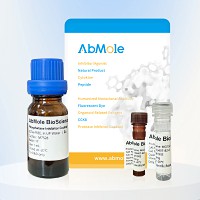All AbMole products are for research use only, cannot be used for human consumption.

Species: Human
Expression system: E. coli
Purity: SDS-PAGE analysis > 97%, HPLC analysis > 97%
Endotoxin: protein content < 1 EU/μg by LAL method
Theoretical molecular weight: 12.4 kDa
Storage and stability: After receiving, the product remains stable at -70°C or -20°C for up to 6 months. After recombination, the product should be stable at 4°C for 1 week or -20°C for 3 months. Avoid repeated freeze-thaw cycles.
Bioactivity: Fully bioactive compared to the standard. The bioactivity of chemotactic bioassays using human lymphocytes was in the concentration range of 1.0-10.0 ng/ mL. Human CCL28 cDNA encodes a 127 amino acid (AA) residue precursor protein and a putative 22 AA residue signal peptide cleaved to yield 105 AA residue mature proteins. Human CCL28 and mouse CCL28 are highly conserved, sharing 83% aa homology in mature regions. Among CC chemokines, CCL28 had the highest homology with CCL27/CTACK. The mouse CCL28 gene has been mapped to the distal region of chromosome 13. Human and mouse CCL28 RNA expression was highest in normal and pathological colons, and the protein was expressed by epithelial cells. Human CL28 RNA is also present in normal and asthmatic lung tissue. The receptor for CCL28 has been identified as CCR10 (GPR2 orphan receptor), which is also the receptor for CCL27/CTACK.
| Solubility (25°C) | Reconstitute the lyophilized powder in sterile distilled water or aqueous buffer containing 0.1 % BSA to a concentration of 0.1-1.0 mg/ml. |
| Storage |
Powder -20°C 3 years ; 4°C 2 years In solvent -80°C 6 months ; -20°C 1 month |
| Related Cytokines and Growth Factors Products |
|---|
| Recombinant Human GDF-15 Protein (HEK293 N-hFc)
Growth-differentiation factor 15 (GDF15), also known as MIC-1, is a secreted member of the transforming growth factor (TGF)-β superfamily. GDF-15 has a role in regulating inflammatory and apoptotic pathways in injured tissues and during disease processes. GDF-15 overexpression arising from an expanded erythroid compartment contributes to iron overload in thalassemia syndromes by inhibiting hepcidin expression. |
| Recombinant Human FGFR1 Protein (HEK293, C-His)
FGFR1, also known as CD331, is a full-length representative protein consists of an extracellular region, composed of three immunoglobulin-like domains, a single hydrophobic membrane-spanning segment and a cytoplasmic tyrosine kinase domain. |
| Recombinant Human FGFR2 Protein (HEK293, C-His)
FGFR2, also known as CD332, acts as cell-surface receptor for fibroblast growth factors and plays an essential role in the regulation of cell proliferation, differentiation, migration and apoptosis, and in the regulation of embryonic development. FGFR2 plays an essential role in the regulation of osteoblast differentiation, proliferation and apoptosis, and is required for normal skeleton development. It also promotes cell proliferation in keratinocytes and imature osteoblasts, but promotes apoptosis in differentiated osteoblasts. |
| Recombinant Mouse BMP-4 Protein (E. coli, C-His)
Bone Morphogenetic Protein-4 (BMP-4) is a critical signaling molecule required for the early differentiation of the embryo and establishing of a dorsal-ventral axis. BMP-4 is secreted from the dorsal portion of the notochord, and it acts in concert with sonic hedgehog to establish a dorsal-ventral axis for the differentiation of later structures. |
| Recombinant Human Coagulation Factor X (HEK293, C-Fc)
Coagulation factor X, belongs to the peptidase S1 family. Coagulation factor X is initially synthesized in the liver. Coagulation factor X is a vitamin K-dependent glycoprotein that converts prothrombin to thrombin in the presence of factor Va, calcium and phospholipid during blood clotting. |
All AbMole products are for research use only, cannot be used for human consumption or veterinary use. We do not provide products or services to individuals. Please comply with the intended use and do not use AbMole products for any other purpose.


Products are for research use only. Not for human use. We do not sell to patients.
© Copyright 2010-2024 AbMole BioScience. All Rights Reserved.
